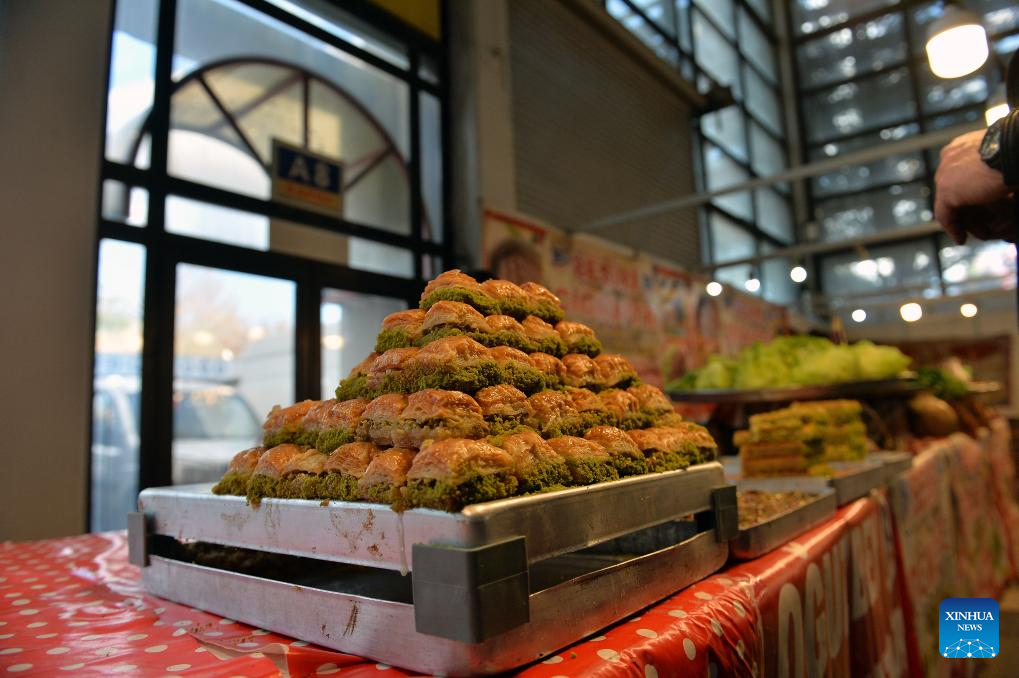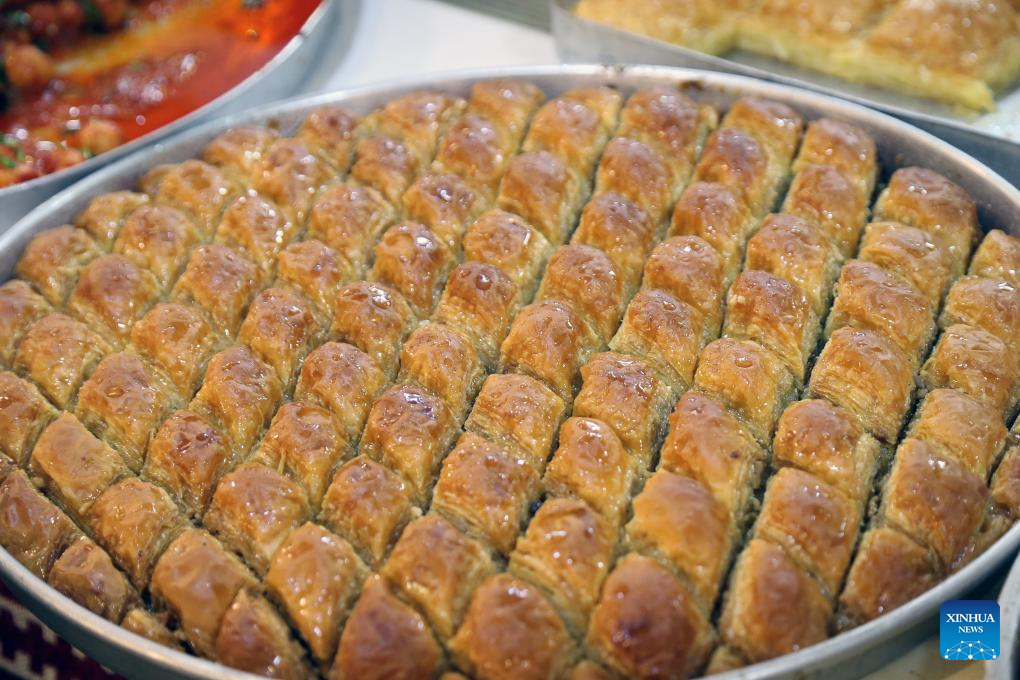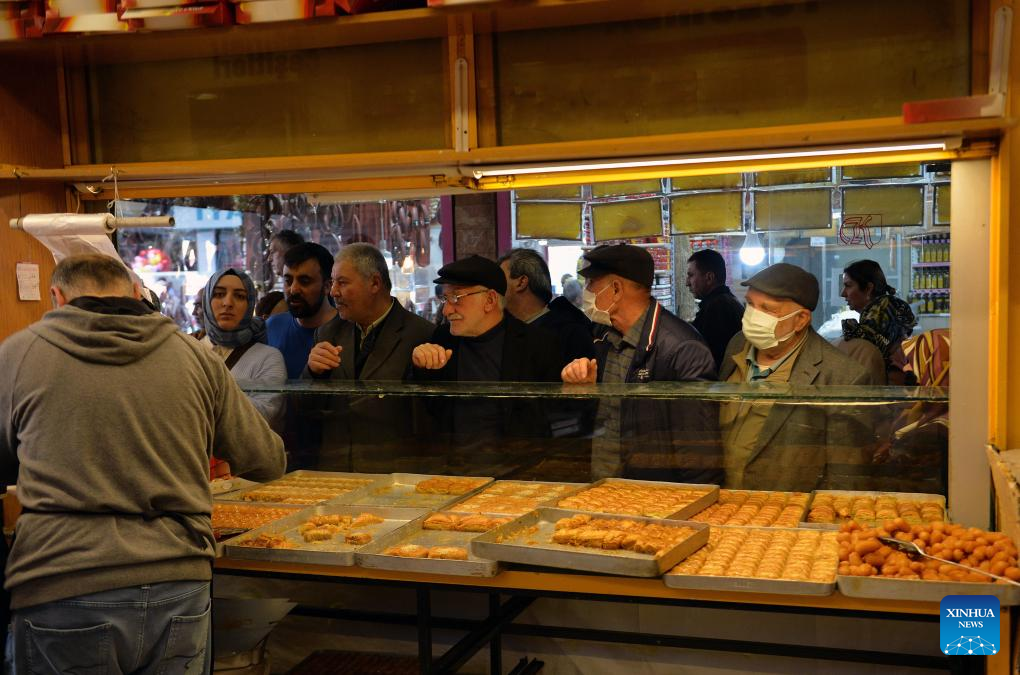
A tray of Baklava, a flaky and nutty pastry that is renowned in Türkiye, is displayed at a bakery in Ankara, Türkiye, on Feb. 1, 2024. (Photo by Mustafa Kaya/Xinhua)
by Burak Akinci
ANKARA, Feb. 2 (Xinhua) -- Sabriye Esen, a retired bank employee, loves baklava, a flaky and nutty pastry that is renowned in Türkiye. But she can no longer afford it.
"I don't have the budget for baklava anymore. It's too expensive," she said while walking in the commercially busy Kizilay neighborhood of Ankara, the capital. "If I buy baklava, I can't buy staple food," Esen added.
Baklava is the latest casualty of Türkiye's soaring food prices, which have made the popular dessert too costly for many people with a sweet tooth.
Food inflation hit 72 percent last December, far above the overall inflation rate of 64.8 percent, according to the Turkish Statistical Institute.
The high inflation, coupled with the depreciation of the Turkish lira, has squeezed the incomes of millions of workers and pensioners, who are struggling to make ends meet. Baklava, along with other delicacies like kebabs, has become a luxury item, with prices rising by 30 percent since the start of the year.
A kilogram of baklava now costs up to 1,000 liras (around 33 U.S. dollars) in well-known shops, while the monthly minimum wage in Türkiye is around 17,000 liras.
Esen said that, in the past, it was considered rude to ask for less than half a kilo of baklava in a shop, but now customers can buy as little as 100 or 150 grams without raising eyebrows.
Baklava is often served on special occasions, such as weddings, religious holidays, and family gatherings. It is made of thin layers of dough, filled with crushed pistachios, walnuts, butter, sugar, or honey, and baked until golden and crisp. Baklava is usually made with 10 to 15 layers of dough, but some masters can make it with up to 40 layers.
While it is believed to have an Ottoman origin, the pastry's popularity has transcended regional boundaries, making it a beloved dessert not only across Türkiye but also in other Middle Eastern countries and Greece.
Some baklava producers have now tried to cope with the rising prices by selling "plain baklava," without the nuts, at a cheaper price.
"The ingredients are expensive, and we hope that our citizens can be sensitive about prices," said Mehmet Akincioglu, chairman of the Baklava Producers Committee of Gaziantep Chamber of Commerce, according to local reports.
Gaziantep, a city near the Syrian border, boasts a centuries-old tradition of baklava making. Here, skilled artisans can spin dough into paper-thin sheets. Yet, even in this haven of baklava, prices range between 800-1,000 liras per kilo, leaving many unable to indulge regularly.
Irem Gezer, an international relief agency worker, said she brought home half a kilo of baklava after a recent trip to Gaziantep, far less than the least two kilos she used to buy for her family and friends.
She said the baklava shop owners complained to her about the high prices due to the rising cost of the ingredients, which had gone up by 100 percent in a year. "They say they don't have another option than to reflect this increase to consumers," she said.
Gezer expressed hope that "Türkiye could recover as soon as possible from its economic troubles to allow Turks to enjoy baklava again." ■

A tray of Baklava, a flaky and nutty pastry that is renowned in Türkiye, is displayed at a bakery in Ankara, Türkiye, on Feb. 1, 2024. (Photo by Mustafa Kaya/Xinhua)

People buy baklava, a flaky and nutty pastry that is renowned in Türkiye, at a bakery in Ankara, Türkiye, on Feb. 1, 2024. (Photo by Mustafa Kaya/Xinhua)



